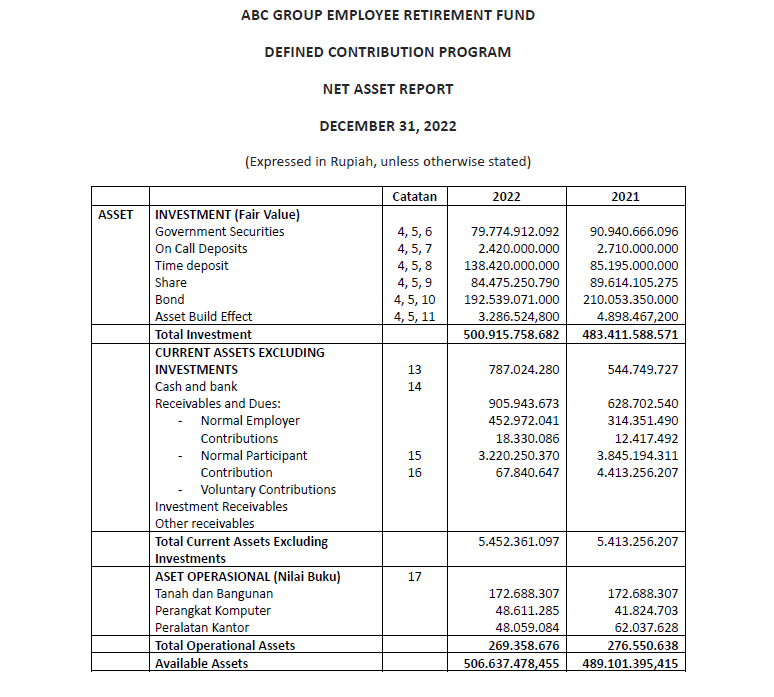Every company keeps records of all its financial transactions. An accountant manages and maintains these records and produces statements based on them. Company financial reports can be done internally or externally. Below, we will discuss the types, benefits, and examples of financial audits.

What is a financial audit?
An audit is an auditor's analysis and verification of a company's financial reports and records. Auditors verify a company's records and statements to see whether they are accurate and representative of the company's financial situation and transactions. These accounts are also checked to see whether they follow acceptable accounting norms or whether there are any malpractices in calculations or the preparation of financial reports. In addition to financial records and reports, audits examine the effectiveness of a company's internal controls. Audits examine accounting processes and help identify ways to simplify and improve them. This process will provide an expert opinion on whether the process can be improved or not.
Types of Financial Audits
Companies can implement two types of audits: external and internal. The following is an explanation of the two types:
- External Audit External audits are carried out by auditors or audit companies outside the company. They are auditors who do not take sides in who they examine. One of the main objectives of an external audit is to ensure the correctness of a company's financial reports. An external audit will try to determine whether there are misrepresentations or misstatements in the financial statements. External audits guarantee stakeholders' trust in making important decisions based on the financial reports issued by the company. Accountants within the company may already be familiar with processes or procedures within the company. Meanwhile, external auditors check the accounts to see whether they comply with acceptable accounting standards. When using an external auditor, the company may already have internal controls in place. External auditors will determine whether existing controls are effective or not because they are not biased in determining audit results.
- Internal Audit
This second type of audit is carried out by audit employees within the company. Internal auditors report directly to management, and their reports are used for internal needs. Internal audits determine whether controls within the company are effective or not and whether the audit process is running as it should. Internal auditors are part of the process, so they tend not to have much criticism of the process or are not objective.
Internal audits provide feedback to management based on their decision-making. Internal audits also verify the accuracy, compliance, and completeness of records. Internal audits are performed more frequently than external audits and can be used to identify employees or departments that are not working on their records properly.
 Benefits of Implementing a Financial Audit
Implementing a financial audit for a company is very important because it has various benefits. Some of the main benefits are:
Benefits of Implementing a Financial Audit
Implementing a financial audit for a company is very important because it has various benefits. Some of the main benefits are: - Check or maintain consistency and compliance. Auditors are experts in financial accounting standards as well as local laws and regulations. If a company intentionally or unintentionally does not comply with accounting or legal standards, an audit will be able to identify the same.
- Effective and control systems By implementing audits, companies can get an objective assessment of the company's processes and internal controls, as well as valuable feedback to improve future performance. Regular audits can help companies develop systems and control them so they can be more effective.
- Insurance claims are easier. In general, insurance claims are only disbursed after a thorough audit is carried out to verify the value of the damage claimed. If audits are carried out regularly, the insurance company will know that the amount claimed is correct and that the insurance can be claimed.
- Check profits and losses. Audited financial reports provide a clear picture of the company's financial status. One of the advantages of a financial audit is that we can clearly determine whether the company is making profits or losses in any area. Audited financial reports are an important management tool in decision-making. Comparing subsequent reports also helps determine whether any policy changes have had an impact on finances.
- Obtain financing and investment Audited reports can increase a company's reputation and trust. In general, companies that have a history of being able to maintain well-audited financial reports will certainly be more attractive to investors and financial institutions. That way, it is easier for companies like this to get investment and loans for company development, and vice versa.
- Detect fraud It cannot be denied that fraud and embezzlement often occur in organisations, whether on a large or small scale. If carried out regularly, audits can help detect cases of fraud within the company. Auditors are also able to help companies take appropriate action according to what the offenders did. Financial audits also act as a deterrent for those who intend to commit violations.
An Example of a Financial Audit
 That was an example of a company's financial report complete with its types and the advantages of applying them. If you want easier company transparency at various company scales, you can use the Tomps by Telkom Indonesia service, which is available as a mobile and web-based digital collaborative management solution.
Tomps prioritises ease in managing company needs by means of online supervision. Tomps offers a variety of very strategic smart features. The transparency and flexibility provided by Tomps can improve company performance. Just visit the Tomps website to get a demo.
That was an example of a company's financial report complete with its types and the advantages of applying them. If you want easier company transparency at various company scales, you can use the Tomps by Telkom Indonesia service, which is available as a mobile and web-based digital collaborative management solution.
Tomps prioritises ease in managing company needs by means of online supervision. Tomps offers a variety of very strategic smart features. The transparency and flexibility provided by Tomps can improve company performance. Just visit the Tomps website to get a demo.







